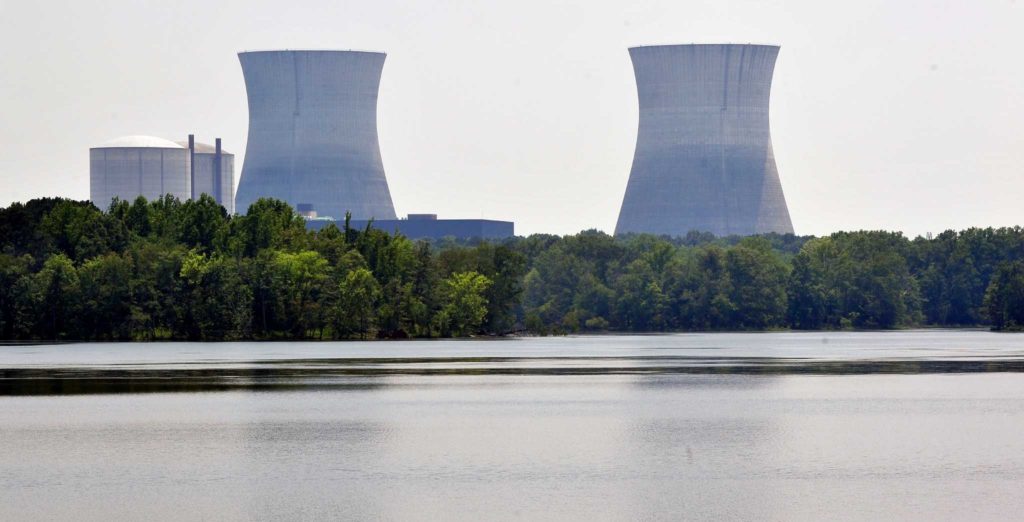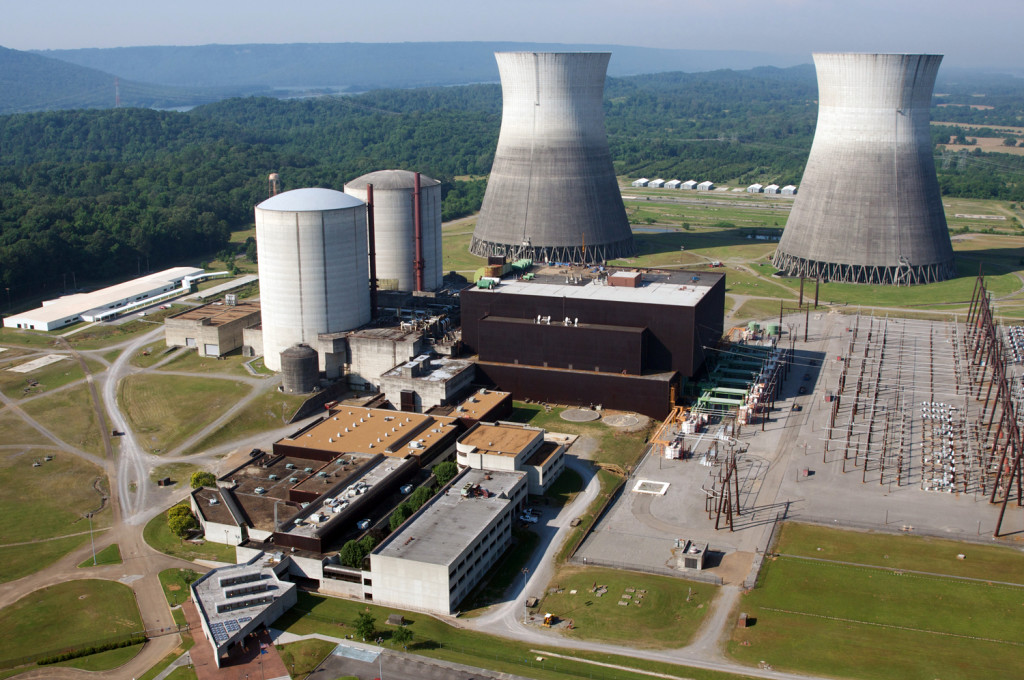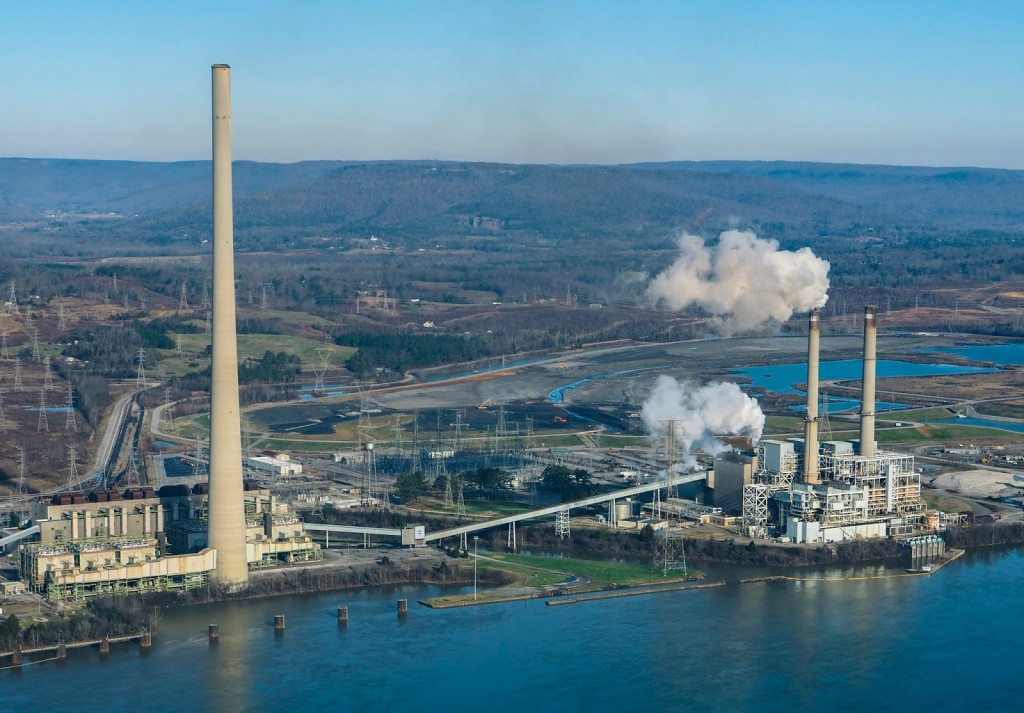TVA considering small modular reactor near Oak Ridge

Just a week after voting to scrap an unfinished 1970s-era nuclear power plant in Alabama, the Tennessee Valley Authority began taking steps toward possible future construction of small modular reactors. Several designs for the new generation reactors are in the pipeline to be certified by the Nuclear Regulatory Commission, TVA spokesman Jim Hopson said in a Monday phone interview. TVA is asking the commission to approve a site plan that could accommodate any one of those designs at its 1,200-acre Clinch River site near Oak Ridge. TVA is the first utility in the country to submit any type of application to the NRC related to small modular reactors, Hopson said. The small reactors produce around 80-200 megawatts of power, he said. In comparison, the traditional reactor at TVA’s Watts Bar Unit 2 will produce around 1,150 megawatts. Unlike large reactors, the small reactors can be operated at different power levels and are designed to be used in combination. They are cheaper to build than large reactors and can be brought online in phases, so the utility could start recouping its investment as soon as the first one was online instead of waiting until an entire plant was finished, Hopson said. TVA is exploring siting up to 800 megawatts at Clinch river, he said. Any construction decision is still several years away. In recent years, TVA has moved away from coal-operated power plants and diversified its power-generation portfolio to include more natural gas and solar. But Hopson said there is still a place for nuclear. “Right now the only type of non-carbon-emitting generation that is available 24/7 is nuclear, so it seems to have a role,” he said. TVA is the nation’s largest public utility, serving more than 9 million people in Alabama, Georgia, Kentucky, Mississippi, North Carolina, Tennessee and Virginia. Republished with permission of The Associated Press.
TVA board votes to sell Bellefonte, Ala. nuclear plant to highest bidder

The nation’s largest public utility is selling a never-completed nuclear plant that has cost more than $4 billion dollars over the past four decades. The Tennessee Valley Authority board voted Tuesday at a meeting in Buchanan to declare the Bellefonte nuclear plant near Hollywood, Alabama, surplus. The site includes two partially finished nuclear reactors, railroad spurs and a helicopter pad. TVA President and CEO Bill Johnson says the 1,600 acre site will be sold at auction to the highest bidder. It has been appraised at $36 million. The decision to sell is the latest blow to the nuclear power industry, which seemed poised for resurgence a decade ago but has been stymied by cheap natural gas, high construction costs and relatively flat demand for power. Republished with permission of the Associated Press.
State utility companies launch Energy Institute of Alabama

Alabama’s biggest utilities just launched a new joint venture: Energy Institute of Alabama. The new institute says its mission is to advocate for energy policies that will help grow the state’s economy, likely including fighting against the Obama administration’s Clean Power Plan and other federal environmental initiatives. The Energy Institute of Alabama says its mission is “to promote reliable, affordable, and clean energy to help grow our economy, create high-paying jobs, and build public support for Alabama’s energy industry.” Former House Speaker Seth Hammett will helm the new endeavor as its Chairman. Hammett represented the Covington area in the state Legislature for 32 years, and later went on to work in the energy industry. Currently, Hammett works as VP of Business Development for PowerSouth Energy, one of the institute’s six major member utilities. The new policy advocacy group’s other members are Alabama Municipal Electric Authority, the Alabama Rural Electric Association, Alabama Power Company, Electric Cities of Alabama, Tennessee Valley Authority, and PowerSouth. Other key players who will steer the institute include: Chuck Karr, Dean of the University of Alabama’s College of Engineering; Corey Tyree, Director of Energy and Environment, Analytics and Strategic Growth at Southern Research; Jim Sullivan, President of The Sullivan Group and former President of the Alabama Public Service Commission; Steven Taylor, Director of Auburn University’s Center for Bioenergy and Bioproducts; and Oliver Kingsley, Jr., Associate Dean of Special Projects at Auburn University’s College of Engineering. “In the past eight years, PACE has worked closely with all of the partners involved in the new Institute in our efforts to effect sensible energy policy in Alabama,” said Lance Brown of the pro-utilities group Partnership for Affordable Clean Energy. “More voices in the energy space means a richer conversation for both policy makers and the public. We look forward to collaborating with the Institute to expand the dialogue on energy issues in Alabama.”
Google to make $600M investment in Widows Creek steam plant

Gov. Robert Bentley joined other state officials, local officials from the Jackson County community and officials from the Tennessee Valley Authority (TVA) to announce that Google will make an initial $600 million investment to create a data center on the grounds of TVA’s Widows Creek Steam Plant in north Jackson County. On its website Google noted that the location would be its 14th. Recent additions include data centers in Iowa, Georgia, Singapore and Belgium. In a prepared statement Google said, “This time, we’re doing something we’ve never done before: We’ll be building on the grounds of the Widows Creek coal power plant in Jackson County, which has been scheduled for shutdown. Data centers need a lot of infrastructure to run 24/7, and there’s a lot of potential in redeveloping large industrial sites like former coal power plants. Decades of investment shouldn’t go to waste just because a site has closed; we can repurpose existing electric and other infrastructure to make sure our data centers are reliably serving our users around the world.” They went on to describe, “Of course, the cleanest energy is the energy you don’t use. Our Alabama data center will incorporate our state-of-the-art energy efficiency technologies. We’ve built our own super-efficient servers, invented more efficient ways to cool our data centers, and even used advanced machine learning to squeeze more out of every watt of power we consume. Compared to five years ago, we now get 3.5 times the computing power out of the same amount of energy.” In a prepared statement released Wednesday afternoon, Governor Bentley said, “Google is one of the world’s most innovative companies that just about every Alabamian interacts with daily. Google’s decision to expand its data center network to Alabama is the start of a long-lasting state partnership that will provide a significant boost to our state’s high-tech sector, provide good jobs for our citizens and position the state for additional growth in this important industry.” Bentley welcomed the media giant to the state saying, “I appreciate Google’s significant investment in Alabama, and I am pleased to welcome them to Sweet Home Alabama.” U.S. Sen. Richard Shelby also issued a prepared statement saying, “Google’s announcement that it will open a data center in Jackson County is positive news for Alabama and proves that our state is a great place for companies of all sizes to do business. I am delighted that Google has chosen Alabama as the home to this investment, and I look forward to the jobs and economic growth that it will bring.” Bill Johnson the President and CEO of the Tennessee Valley Authority said, “Economic development is a vital part of TVA’s mission to serve the people of the Tennessee Valley. TVA is committed to a diverse energy portfolio and providing reliable, low-cost and ever-cleaner energy to attract new companies and investments to the region.” “Google could have located their next data center anywhere in the world, but they chose a soon-to-be retired coal plant site with the right infrastructure in rural Alabama,” Johnson said. “What began as a power generation facility will now become a data center harnessing the power of the Internet to connect people all over the world.” According to the governor’s office projections, Google will make an estimated $600 million initial investment, with opportunities for expansion. The initial project is expected to create 75 to 100 jobs. Last year, Google passed over Alabama for one of its high-speed fiber-optic network cities.


